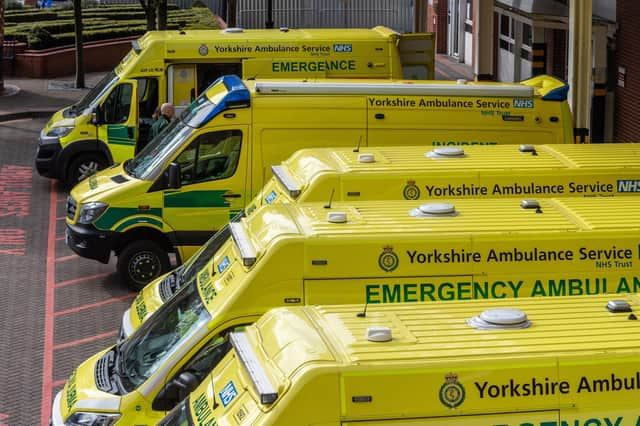Yorkshire Ambulance Service hit by 'significant staff sickness' due to Covid


An internal NHS letter sent to all acute hospital trust chief executives in the region on Thursday, December 30, said that as part of the response to an “initial wave” of Covid cases amongst YAS staff there would be a “likely reduction” in the use of ambulances for non-emergency patient transfer services.
The letter, which was first leaked to the Sunday Times, said hospitals should adopt a “zero tolerance” for delays of over 15 minutes between ambulances arriving and paramedics being able to hand over patients to the care of A&E staff. It warned that if YAS has to declare a major incident, all ambulance crews will complete a “rapid handover” of patients and be immediately released to respond to other emergencies.
Advertisement
Hide AdAdvertisement
Hide AdIt said of the current situation: “Prior to Christmas we discussed the likelihood that our region would see significant and rapid increases in community rates of Covid infection before Christmas and this would include an increase in staff absence as we moved through to the New Year.
“In the last 72 hours, Yorkshire Ambulance Service has seen the first signs of this wave seeing significant staffing sickness across a number of key services.”
While YAS did not provide specific figures for current staff absences, the organisation admitted the issue is having an impact on its services in association with ongoing high demand.
A spokesperson for Yorkshire Ambulance Service NHS Trust said: “Like all other ambulance services across the country, we are continuing to experience high demand for our services. Coupled with the added challenge of COVID-19 related absence amongst staff, this is having a significant impact on our frontline operations.
Advertisement
Hide AdAdvertisement
Hide Ad“Our dedicated staff are doing their best to respond as quickly as possible to all 999 calls, but we acknowledge that some patients are having to wait longer at exceptionally busy times.
“All emergency calls are categorised according to the nature of a patient’s illness or injury and those in a life-threatening condition are always prioritised. It’s important that members of the public only call 999 for an ambulance when it is a serious or life-threatening emergency. This will help us to focus our efforts on our most poorly patients.
“You can also help us by not calling back to check where the ambulance is as we need those phone lines to be free for those in a life-threatening condition. However, if you feel you no longer need an ambulance, it’s important that you let us know.
“For anyone with less serious illnesses and injuries, they should consider self-care, their local pharmacy, GP surgery, urgent care centre or making their own way to the emergency department. Our NHS 111 service is also available online at 111.nhs.uk or by calling 111.
Advertisement
Hide AdAdvertisement
Hide Ad“We continue to monitor the situation closely and thank all our hard-working staff for their efforts at this challenging time.”
A spokesperson for the NHS in the North East and Yorkshire said: “Rising infection rates and hospitalisations are inevitably leading to increased demand and staff absences, so it’s right the NHS has robust plans in place. The public can help NHS staff be there for those patients who need them most by getting their booster jab and by using the free 24/7 NHS 111 online or phone service for urgent health issues.”
It was revealed over the weekend that the Government is asking public sector organisations to prepare for worst-case scenarios of having up to a quarter of their staff off work at any one time due to the spread of Covid.
Health minister Ed Argar said this was a “responsible” move from the Government.
Advertisement
Hide AdAdvertisement
Hide AdAsked on Times Radio about the advice, he said: “What you’re talking about there is Government doing the responsible and sensible thing of preparing for a range of contingencies, making sure that it considers all possible eventualities, even those that are at the very high end of the scale.”
On whether he thought such absence levels were likely to eventuate, Mr Argar said: “I think we model a range of scenarios up to things we think are highly unlikely, but you still do it because that’s what a responsible Government does in preparing for all eventualities.”
Testing plan for secondary schools revealed
All secondary schools have been asked to provide an on-site Covid test for pupils as they return to classrooms from this week.
Pupils over 11 along with teachers and early years staff are being advised to test twice a week, along with college and university students.
Advertisement
Hide AdAdvertisement
Hide AdEducation Secretary Nadhim Zahawi said: “Being in face to face learning is undoubtedly the very best place for children and young people’s education and wellbeing, and my priority remains on keeping early years settings, schools, colleges and universities open so that face-to-face education can continue.”
It comes as the UK recorded a further 137,583 Covid cases and 73 deaths within 28 days of a positive test on Sunday.
Read more:
Support The Yorkshire Post and become a subscriber today. Your subscription will help us to continue to bring quality news to the people of Yorkshire. In return, you'll see fewer ads on site, get free access to our app and receive exclusive members-only offers. Click here to subscribe.